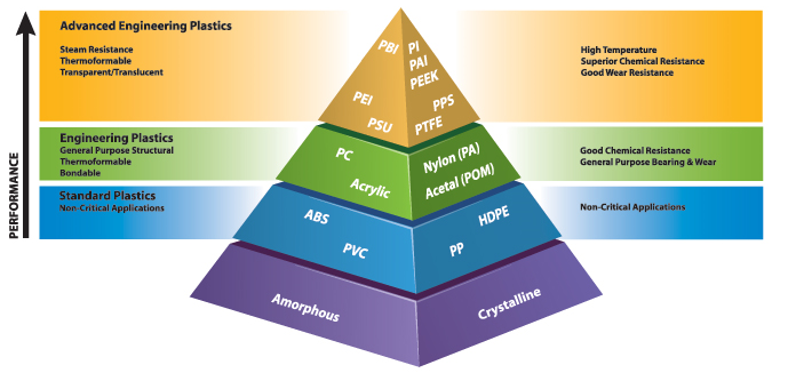 Texas Injection Molding is advancing significant cost savings and improved production rates to product applications previously limited to thermoset composites, aluminum or steel.
Texas Injection Molding is advancing significant cost savings and improved production rates to product applications previously limited to thermoset composites, aluminum or steel.
Thermoset Materials: Thermoset materials combine reactive materials and a catalyst such as heat to begin a process of curing that takes several minutes to complete. Once cured thermoset materials will not soften like thermoplastic materials. Glass or other additive materials are combined with the thermoset material to create end products that are extremely strong and can withstand continuous use in high temperatures. Production output is limited by the reaction and curing time of the thermoset resin. Typically, the resin is produced in stock shapes and subsequently machined to the required part geometry. The secondary machining adds expense and further adds to lead time and throughput.
Compression Molding: Compression molding is a manufacturing process that allows the thermoset material in a paste form to be “compressed” under pressure at high temperatures that serve as the catalyst. The compression molding process eliminates most if not all of the secondary machining steps, but is still limited by the reaction and curing time of the thermoset materials. Mult-cavity molds can offset this reaction time to improve efficiency, but does not come close to the efficiencies of injection molding.
Injection Molding: Recent development in thermoplastic resin technology and advanced glass characteristics have opened the door for injection molding to fill the requirements of applications traditionally serviced by thermoset composites, aluminum and steel. End use customers are developing opportunities to take advantage of the high-volume throughput (reduced production lead-times), lower weight, and lower cost that injection molding thermoplastic composites provide.
Illustration: Relative performance of materials. 60% GF Nylon 66 is a specialty engineering grade glass filled Nylon 66 injection molding designed to outperform other injection molding grade thermoplastic composites to reduce cost and lead time of machined materials.
| Properties | 60% GF Nylon | Standard 50% GF PA66 (1) | Aluminum 6061-T6 | AISI 1020 Steel | Glass/Epoxy Prepreg (2) |
| Density (g/cc) | 1.79 | 1.57 | 2.7 | 7.8 | 1.79 |
| Tensile Strength (mPa) | 270 | 240 | 276 yield | 200-2100 yield | 402 |
| Tensile Modulus (mPa) | 22,500 | 17,000 | 68,900 | 200,000 | 23,900 |
| Tensile Elongation (%) | 1-3 | 2.4 | 12 | 15 | 0.8-1 |
Conclusions:
- 60% GF Nylon offers equivalent properties of metal at a fraction of their density
- 30%+ lighter parts than metallic equivalent components
- Can be molded to final shape to eliminate machining costs
- Much lower cost processing vs glass/epoxy prepreg
- 60% GF Nylon offers increased properties vs. competitive PA66 grades
- Equivalent stiffness of glass/epoxy prepregs at a fraction of final part cost
**Table data and analysis provided by Composite Techs LLC http://www.compositetechs.com/
